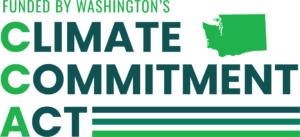Five projects will receive $1.2 million from state Climate Commitment Act and EPA funds to advance local salmon recovery efforts
OLYMPIA, Wash. – The Washington State Department of Commerce is awarding approximately $1.2 million to four local governments and one tribe to support long-range planning in support of salmon recovery efforts. The funding will help integrate salmon recovery work into local growth management and land use planning and development regulations. Grants are funded through the state’s Climate Commitment Act and U.S. Environmental Protection Agency (EPA) Puget Sound funds.
Protecting and restoring habitat is a critical component of salmon recovery. Many of the impacts on salmon habitat stem from land use changes and development regulated by local governments. Effective integration of salmon habitat protection at the local planning level is vital to overall salmon recovery.
Today, 14 population groups of steelhead trout and Chinook, coho, chum, and sockeye salmon in Washington state are listed as threatened or endangered under the Endangered Species Act. Salmon recovery is a major component of the Climate Commitment Act, with $153 million appropriated for salmon recovery projects in the state’s 2023-2025 budgets.
“We all play a role in protecting and restoring Washington’s iconic salmon. I’m glad we can put Climate Commitment Act funding to work in these communities to support the planning and coordination of these urgent conservation efforts,” said Gov. Jay Inslee.
“The protection of our natural resources, particularly salmon habitat, is vital not only for our environment but for the long-term sustainability of our communities,” said Commerce Director Mike Fong. “This funding empowers local governments and tribes to create and implement comprehensive plans that will ensure the health of our ecosystems while meeting the needs of our growing population.”
The grant awardees will work to develop comprehensive land management regulations and enforcement strategies to protect and restore salmon habitat and water quality through the following activities:
- Conducting research and advancing new approaches to water resource management
- Incentivizing implementation of low impact development and green stormwater infrastructure
- Developing a wetland mitigation bank
- Creating an urban tree canopy preservation program
Grant awardees are:
- City of Everett: $250,000
- City of Ilwaco: $212,500
- City of Lake Stevens: $247,339
- Snoqualmie Indian Tribe: $230,011
- Thurston County: $250,000
“With this grant, the city aims to develop a basin-level watershed plan that will use scientific data to influence future planning efforts both locally and among our neighboring jurisdictions, with overall goals to improve water quality, protect salmon runs connected to our lake, and improve open space habitat for all members of the community,” said Olin Anderson, Surface Water Coordinator for the City of Lake Stevens.
The Washington State Department of Commerce and the Puget Sound National Estuary Program’s Stormwater Strategic Initiative worked together to develop this unique local planning grant program to support local governments and tribes working on salmon recovery. Grants are available to cities and counties planning under the Growth Management Act, and federally recognized tribes. Commerce will open a second round of grant applications this fall.
 Climate grants from Commerce are provided with funding from Washington’s Climate Commitment Act. The CCA supports Washington’s climate action efforts by putting cap-and-invest dollars to work reducing climate pollution, creating jobs, and improving public health. Information about the CCA is available at www.climate.wa.gov.
Climate grants from Commerce are provided with funding from Washington’s Climate Commitment Act. The CCA supports Washington’s climate action efforts by putting cap-and-invest dollars to work reducing climate pollution, creating jobs, and improving public health. Information about the CCA is available at www.climate.wa.gov.
